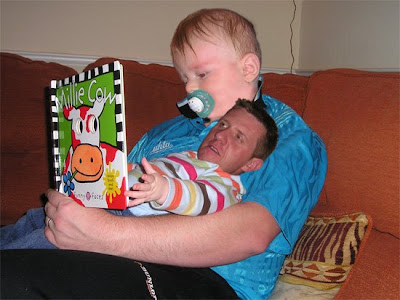Oh no! That’s not my special place at all. That’s the most important dance craze sweeping Paris (since 2000). Why have I never heard of Tecktonik until now? Perhaps it’s because I’ve been too busy with more important matters. Perhaps not. Either way, I’ve lost count of the number of people who’ve recently stopped me on the street to say “Born D, Tecktonik is just a lame mashup of vogueing, krumping and wacking set to Euroclash music with a weird hand-spinning-around-the-head movement, dude.”
My enthusiasm for this new (I’m tempted to write neu just to sound more European) dance style matched with my lack of credibility adds up to nothing less than a total endorsement of Tecktonik, and I have the lack of friends to prove it.
At its “best” (and I use the term under legal counsel), Tecktonik is supposed to look like it does in the video above. But more often than not, it comes out like this.
Did Reebok actually pay someone to make that last ad? Seriously. That's not good dancing. And it's not even a good video clip - drive to a desert and get people to half-heartedly dance around, occasionally on top of a mirror or piece of aluminium foil or something. How was that pitched? I don't know that it makes the difficult leap to "concept", fitting more into the class of "random neuron activity".
Overall though the phrase I’d use here is HYPNOTIC LAMENESS. I know that describes 90% of the internet, but I really am transfixed by these kids and their low-energy arm windmilling, their pretty basic footwork and their unselfconsciousness. Best of all, Tecktonik is all over the streets of Paris. Someone I know took a trip there not long ago and reported that very average Tecktonik dancers were to be found hawking their wares on the rues and boulevards at every turn. It’s not that they’re any good – quite the opposite, according to my insider – it’s that they are there. That’s what I find really rad. People dancing in public with no discernible motive is always worth voting for. This article suggests how Tecktonik can be a good thing for Troubled Teens:
"Dancing has changed me," says Sofian, a 15-year-old from a tough Paris suburb who discovered Tecktonik recently.
"Before I was on the street. I was at the police station everyday. It's been two or three months now since I did anything stupid."
It's refreshing to see the thing figured as a positive social phenomenon, not a Kids on the Street are Dangerous and Probably On Drugs beat-up.
I spent the month of May in Japan for some damn reason, and when I was there I saw an incredible amount of street dancing. It was mainly centred in Nagoya. I’d walk past a park and see dozens of groups of people dancing. Everything from hip-hop and R&B style to old fashioned fan and drums dances. I couldn’t work out why. Someone told me it was because studio space is expensive so it’s cheaper just to do it on the street.
These people seemed to be on a break from work, just having an old knees-up during lunch.These girls were practicing some R&B moves in a park.
This huge outfit wase doing some kind of old-fashioned traditional thing.
I’ve seen a good bit of dance since getting back – Michelle Heaven’s Disagreeable Object and Jo Lloyd’s Apparently That’s What Happened were the best of the bunch – but I’ll review them elsewhere. For now, I wish there were more street-dancing here. Even if it was vaguely irritating French dudes in Reeboks doing it.
In other news, I've just gotten back from the Helpmann Awards nomination announcements. A pretty wham-bam affair, competently compered by Rob Guest, a no-nonsense Helen Dallimore, Lisa McCune phoning it in and Ian Stenlake delivering more laughs than anything in Guys and Dolls. Here are a few that may be of interest to someone reading.
Best choreography in a dance thing that's not a musical
Tanya Liedtke, Construct
Lloyd Newson, To Be Straight with You
Gideon Obarzaneck, Glow
Christopher Wheeldon, After the Rain
Best contemporary concert or something
Bjork on the Sydney Opera House steps
Bon Jovi
Justin Timberlake
Rufus Wainwright
Best comedy performer
The Umbilical Brothers, Julia Morris, Ross Noble, Frank Woodley
Best dancer (dude)
Steven Heathcote, After the Rain
Akram Khan, Sacred Monsters
Gavin Webber, Roadkill
Paul White, Construct
Best dancer (dudette)
Sara Black, Glow
Lucinda Dunn, Nutcracker (I think)
Sarah-Jayne Howard, Roadkill
Larissa McGowan (can't recall what for)
Best male actor in a play
Marton Csokas, Who's Afraid of Virginia Woolf?
Martin Nieidermayer, The Tell-Tale Heart
Richard Roxborough, Toy Symphony
Geoffrey Rush, Exit the King
Best female actor in a play
Kate Dickey, Alst
Catherine McClements, Who's Afraid of Virginia Woolf?
Genevieve Picot, Rock and Roll
Leah Purcell (can't remember what for)
Best dance thing
Glow, Roadkill, The Nutcracker, Sacred Monsters
Best play thing
Black Watch (huh?), Toy Symphony, When the Rain Stops Falling, Who's Afraid of Virginia Woolf?










